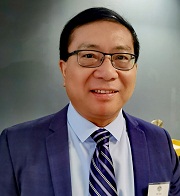
Prof. Hai Guo
The Hong Kong Polytechnic University, China
Title: How can air quality benefit from sustainable urban construction and transportation development in the context of climate change?
Abstract:
Urban construction and renewal are
expanding to meet the needs of economic development and population growth. Hong
Kong is planning and constructing Northern Metropolitan Circle on undeveloped
land and renewal projects in existing urban areas. However, uncontrolled
expansion and renewal may lead to a stuffy environment, resulting in
accumulation of air pollutants and formation of secondary air pollutants (SAP),
i.e. ozone (O3) and secondary organic aerosols (SOA). These problems
may be further exacerbated by climate change. Although many studies have
investigated effects of building height and/or density on street ventilation,
air quality at different heights around tall buildings remains under-explored.
Particularly, concentrations of SAP may increase with height because air at
higher locations is more aged. To address the issue, multiple sampling points
will be deployed at various heights to measure meteorological parameters and
air pollutants, i.e. O3, SOA and their precursors. A photochemical
box model will be applied to study chemical processes of pollutants. Moreover,
a computational fluid dynamics model will be employed to characterize airflow
field and dispersion of air pollutants at different building heights. Vertical
distributions of primary and secondary air pollutants along high-rise buildings
in urban renewal will be obtained. Meanwhile, observations and simulations of
building parameters will be applied to new urban areas to forecast air quality
around projected buildings. Updated land use information will be retrieved from
the Planning Department, satellite data and measurements as initial conditions
for regional-scale model simulations.
Keywords: 1) Air quality; 2) Urban renewal; 3) New metropolitan construction; 4) Green
transportation; 5) Climate change
Biography:
Professor
Hai Guo completed
his PhD study in Australia. He is currently a Professor in the Hong Kong
Polytechnic University (PolyU) and Air Lab in charge. He is the Changjiang
Scholar Chair Professor and the Fellow of Hong Kong Institution of Engineers.
Prof. Guo’s research interests include atmospheric chemistry, organic aerosols
and their precursors, ozone pollution, bioaerosol transmission and indoor
chemistry. He is among the first to have developed a photochemical trajectory
model and a photochemical box model to understand atmospheric ozone formation
in Asia. He is also the first person in Hong Kong to establish a world-class laboratory
instrument system to analyse trace volatile organic compounds (VOCs). He has
developed offline and semi-online samplers for measuring ambient acidic
ultrafine particles. Prof. Guo is an investigator of more than 70 research
projects. He has published more than 190 papers, with an h-index of 60 on
Google scholar with total citation of ~12,300, and 55 on Scopus. He has been
ranked the World’s Top 2% Highly Cited Scientist in Meteorology and Atmospheric
Sciences in 2020-2022. Prof. Guo is the VOC expert group member of the World
Meteorological Organization – Global Atmosphere Watch. He is the Chairman of
the International Expert Workshop on VOCs 2023. Furthermore, Prof. Guo is
Associate Editor of Science of the Total Environment, and Editor of Aerosol and
Air Quality Research. Prof. Guo has won many prizes including a second prize of
natural science issued by China’s Ministry of Education, first prize of science
and technology in Guangdong province, golden medal and a special merit award at
the 71st International Trade Fair for Ideas, Inventions & New Products in
Germany, Winner of the Australia China Alumni Awards for Research and Science,
and eight-time Dean awards for outstanding research and publication at PolyU.
Prof. Guo has given plenary, keynotes, and invited speeches in many
international conferences and been a member of Scientific Advisor Committee in
many conferences.